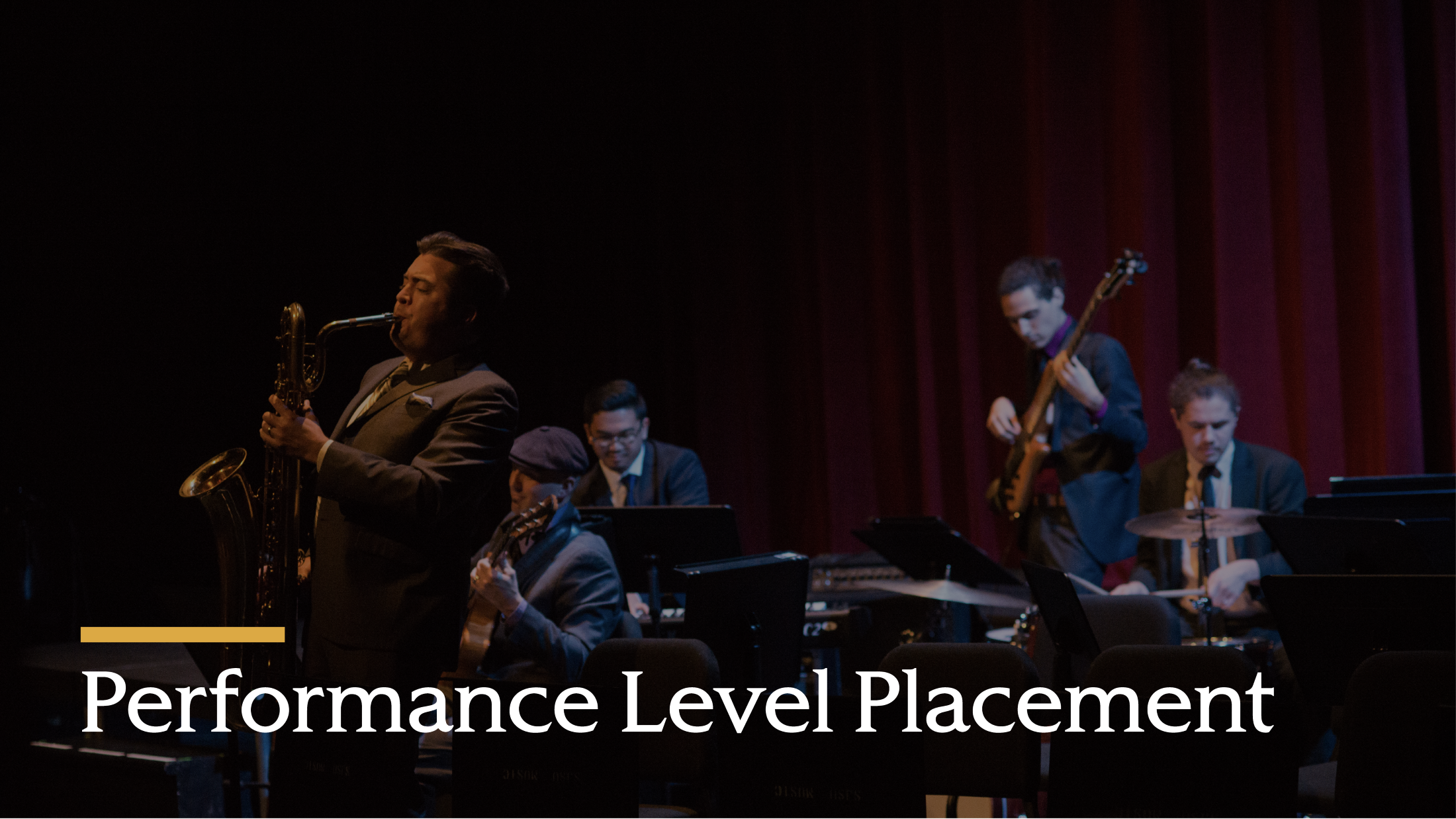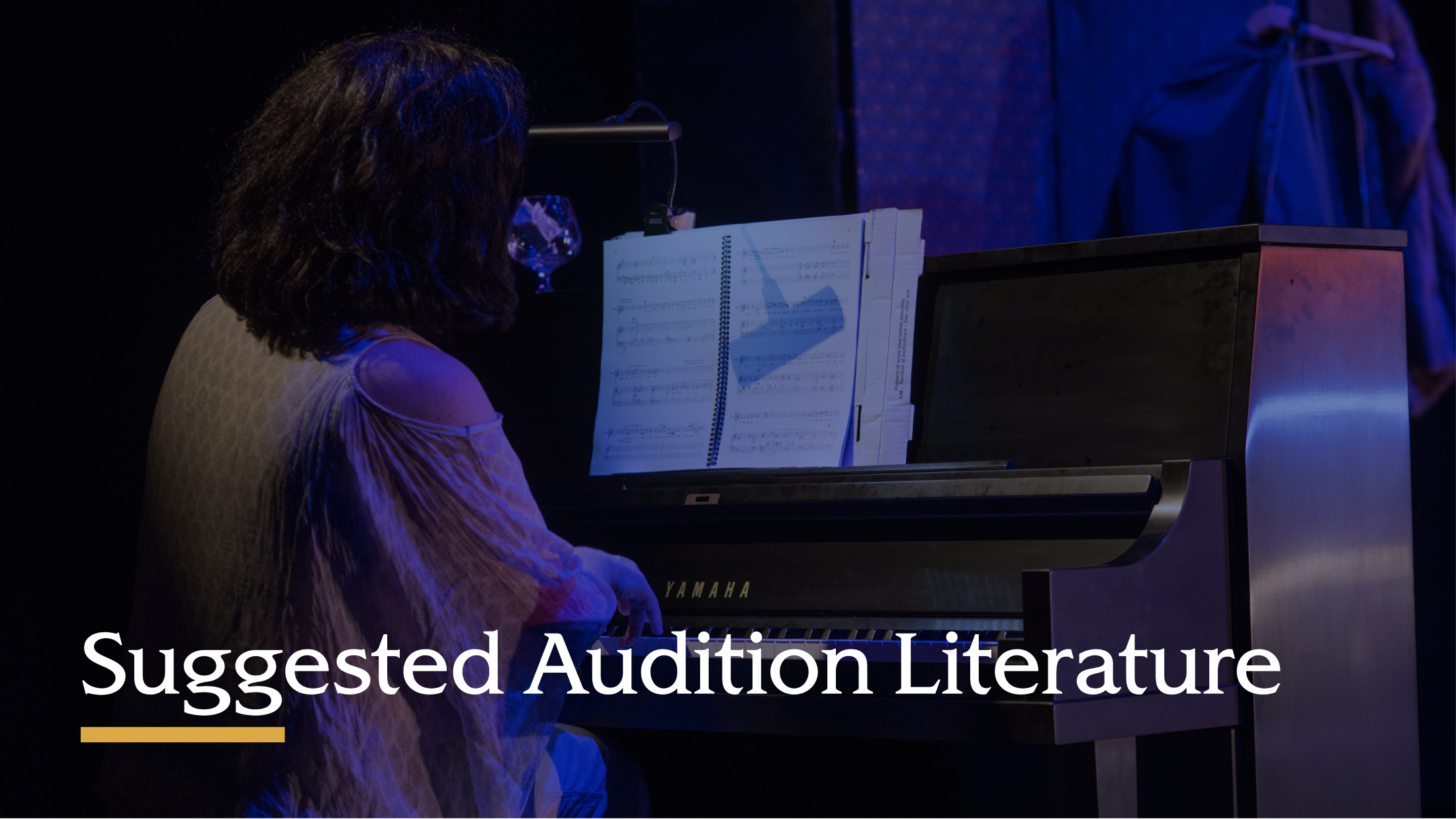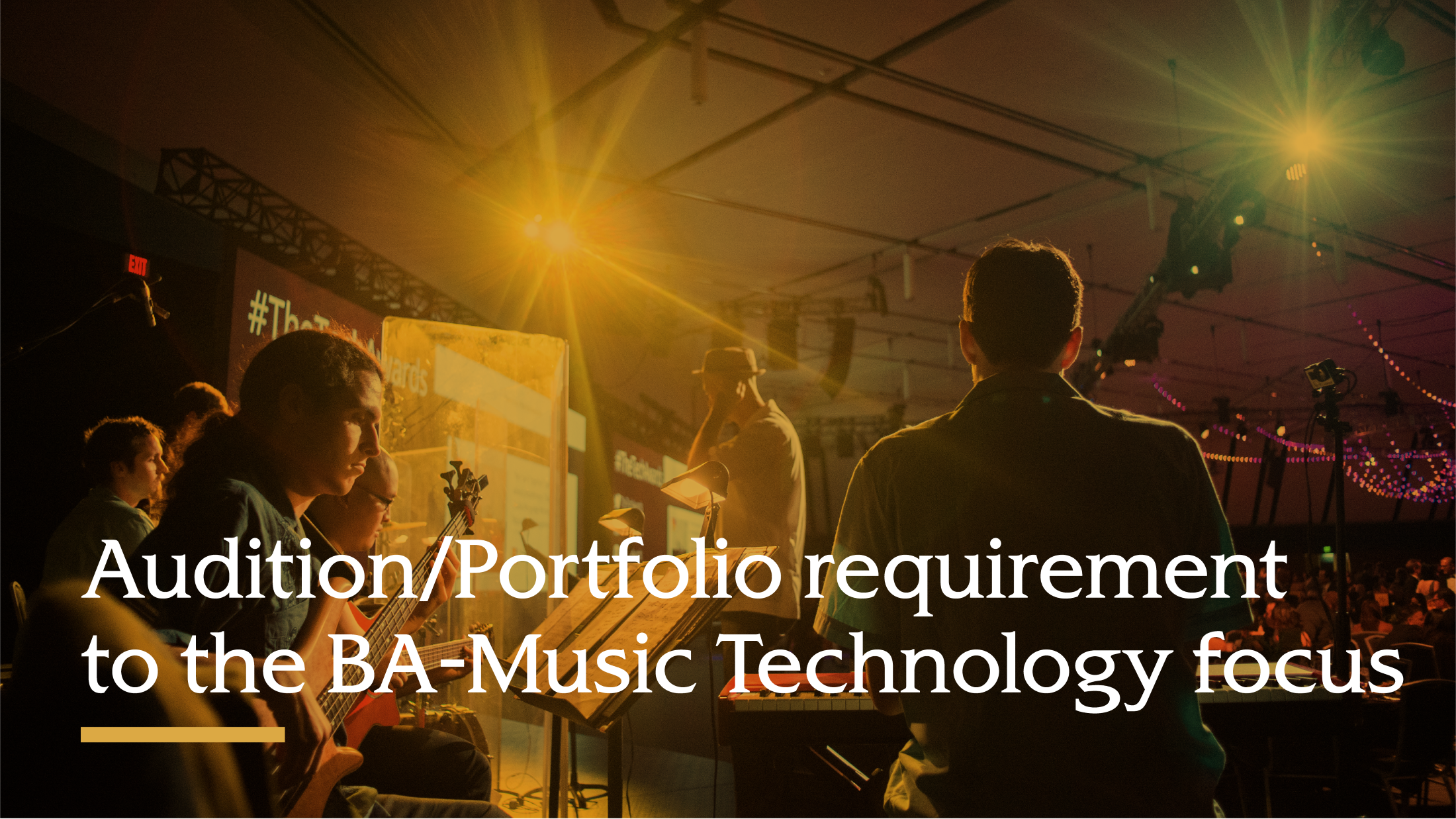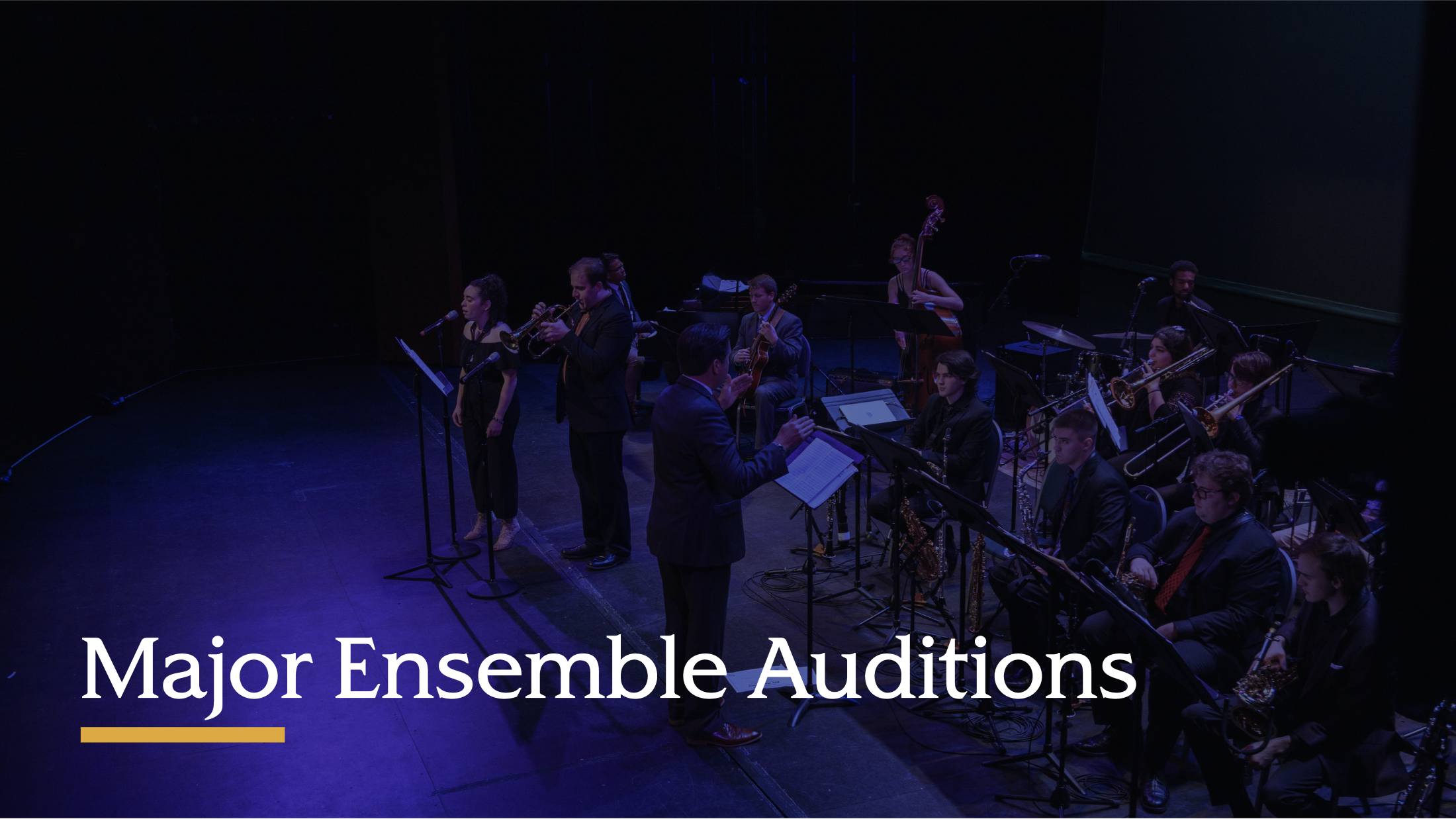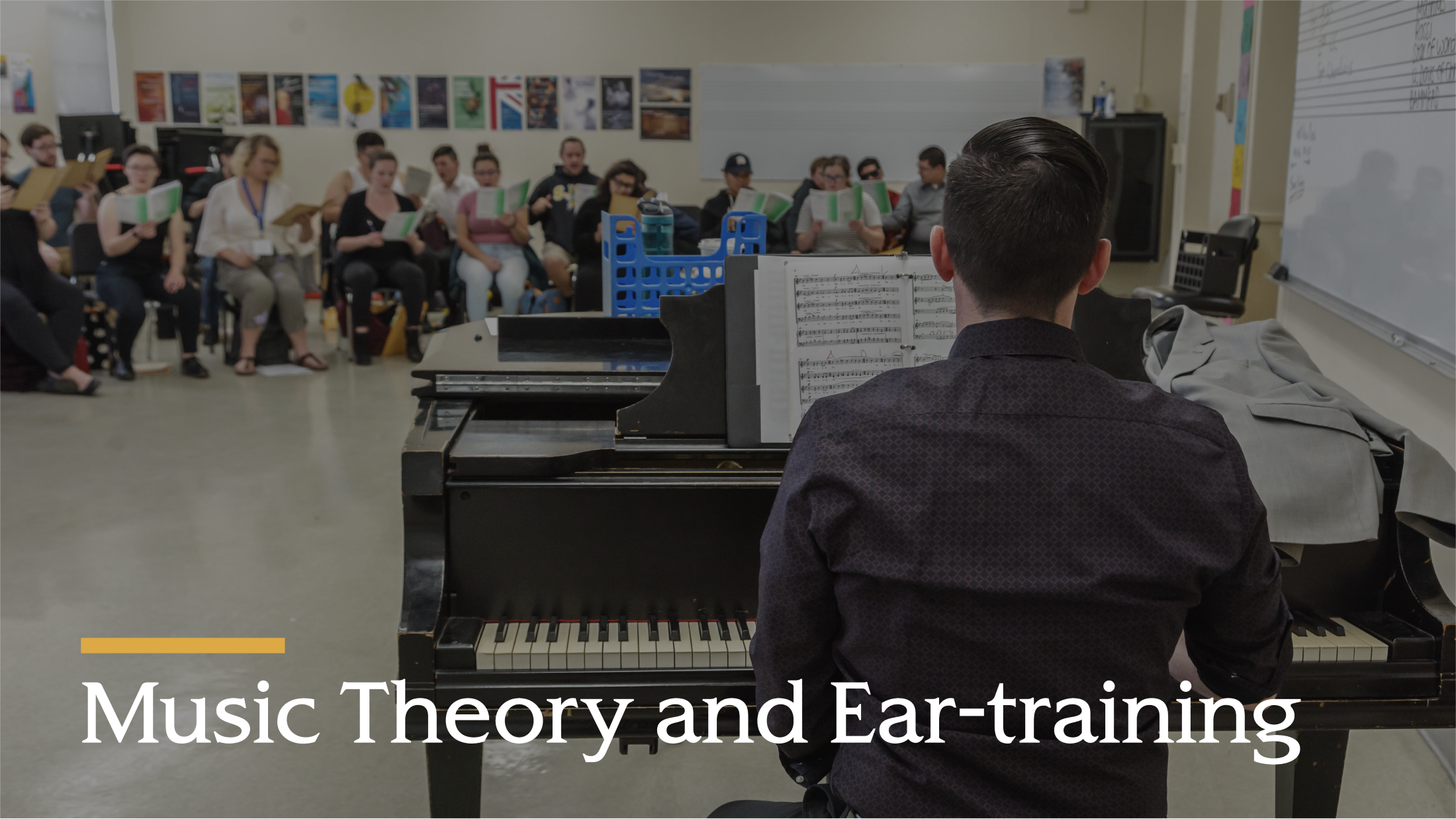Entrance Auditions
IMPORTANT: Please read our How to Apply page for information on applying SJSU and the School of Music and Dance.
On-campus School of Music audition dates for entrance in Fall 2026:
- Saturday, February 14, 2026 — School of Music, SJSU
- Saturday, February 28, 2026 — School of Music, SJSU
Off-campus School of Music audition dates (in Southern California) for entrance in Fall 2026:
- Saturday, February 21, 2026 — Location TBD
Deadline for School of Music video audition submission for entrance in Fall 2026:
- Saturday, February 7, 2026
Other audition times may be made available on an individual basis. Contact the School of Music recruitment office at (408) 924-4673 or musicrecruitment@sjsu.edu
IMPORTANT: Check your email often for communication from SJSU and the School of Music about scheduling your audition.
NOTE: Ensemble placement auditions are spearate from entrance auditions and are held prior to the first day of classes in the fall semester. Exact dates and times will listed on the website under the appropriate ensemble. Please contact ensemble directors for more details.
Applied Music Placement
Each music major must declare, with approval of the appropriate applied music committee, a principal performance medium and carry on continuous study in one of the following areas:
| Brass | Woodwinds | Strings | Piano | Percussion | Voice |
| Horn | Flute | Violin | |||
| Trumpet | Oboe | Viola | |||
| Trombone | Bassoon | Cello | |||
| Euphonium | Clarinet | Bass (Acoustic/Electric) | |||
| Tuba | Saxophone | Harp | |||
| Guitar (Acoustic/Electric) |
Performance Level Placement
For transfer students, your audition will place you at one of the following levels consistent with the School of Music's performance standards:
| Level | Year of Study |
|---|---|
|
Level One |
Freshman, First Semester |
|
Level Two |
Freshman, Second Semester |
|
Level Three |
Sophomore, First Semester |
|
Level Four |
Sophomore, Second Semester |
|
Level Five* |
Junior, First Semester |
|
Level Six |
Junior, Second Semester |
|
Level Seven |
Senior, First Semester |
|
Level Eight |
Senior, Second Semester |
|
Level Nine |
Graduate, Unclassified |
|
Level Ten |
Graduate, Classified |
Important note: Students may be placed at an applied level below their university standing. Once any remediation has been completed, a student may request to be placed at a higher performance level at their regular semester-end applied jury.
* All students must pass a SJSU Junior Qualifying Jury prior to placement in level five or above.
Suggested Audition Literature
Auditionees will prepare a variety of selections, totaling approximately 20 to 30 minutes.
Here is a list of suggested audition materials.
Audition/Portfolio Requirement to the BA-Music Technology Focus
While an emphasis in Music Technology may be declared from the freshman year, admission to individual studio arts instruction is predicated upon the following:
- Successful completion of first-year requirements in applied lessons on your primary instrument or voice.
- Completion of MUSC 170A, 170B, and 167 with a grade of B- or better.
- Presentation of a portfolio of well-constructed recordings of at least one live ensemble concert and one full studio recording involving multiple instruments, voices, and/or sound effects, each over one half-hour in length.
- Short projects demonstrating original sound composition and/or combined media techniques.
Major Ensemble Auditions
All undergraduate Bachelor of Music (BM) majors must enroll in a performance ensemble each semester they are enrolled as a BM major. All students enrolled in applied lessons must be enrolled in a performance ensemble. Graduate students may apply 3 units of ensemble credit to the graduate requirements of 30 units.
For more information on each ensemble, see Performance Ensembles.
Woodwinds, Brass and Percussion
Wind Ensemble, Symphonic Band and Symphony Orchesra are the appropriate performing ensembles. Students must play a prepared piece and sightread. Auditions take place the two days before classes begin each semester.
Strings
Orchestra is the appropriate performing ensemble. Students must play a prepared piece and sightread. Auditions take place the two days before classes begin each semester.
Vocal Majors
Concert Choir or Choraliers are the appropriate performing ensembles. Auditions take place the two days before classes begin each semester.
Jazz Studies
The Jazz Orchestra and Latin Jazz Ensemble are appropriate performing ensembles.
Piano Students
Consult with the Area Coordinator for Keyboard Studies for appropriate major ensembles.
Make-up Ensemble Auditions
A student who misses his or her ensemble audition should contact the conductor of the ensemble for information on make-up auditions. Make-up auditions might not be scheduled in all areas, in which case the student's audition would be postponed until the following semester. Therefore, students should make every effort to audition during scheduled audition times.
Music Theory and Ear-Training Placement Examination
Incoming High School Students
A placement examination will be offered on-line in the weeks previous to the start of classes in the fall semester, as well as during the first meeting of MUSC 9 and MUSC 1A. Your score in the placement exam will determine if you will start in MUSC 9 (Music Fundamentals) or MUSC 1A (Music Theory 1). Both MUSC 9 and MUSC 1A meet at the same time; incoming high school students may register for either, and will be placed in the appropriate section after the first day of classes. If you do not complete the placement exam you will be placed into MUSC 9.
The purpose of the following is to help entering music majors better prepare themselves for freshman level music classes. While much of this material will be discussed and reviewed in classes, it is in the student's best interest to have a working knowledge and familiarity with some theory, terminology and music history.
Entering students should be familiar with following tasks:
- Reading standard music notation in both treble and bass clefs;
- Understanding basic rhythmic notation for both notes and rests;
- Knowing major and minor key signatures;
- Understanding whole- and half-steps as they relate to scales (scale patterns);
- Understanding simple triads (three-note chords);
- Understanding basic musical terminology as related to tempo, style and performance;
- Understanding a brief overview of musical periods and a basic knowledge of significant composers from each era.
- For additional references, please consult from among the following sources.
Study Sources (a very partial list)
-
Tagg, Philip. Everyday Tonality II (towards a tonal theory of what most people hear).New York & Huddersfield: The Mass Media Music Scholars’ Press, 2014 Download the PDF text here (after payment of about $7 or 5 British Pounds):. - Open Music Theory (an open-source, interactive, online “text”book for college-level music theory courses)
- Musictheory.net provides free content—lessons and exams—for the content listed in the numbered bullets (#1-6) shown above.
- Online Music Theory Flash Cards are helpful with testing yourself on music rudiments.
- Berkelee's free Music Theory Handbook
- YouTube's Basic Music Theory
- eTheory: Music Theory Fundamentals in Four Weeks: eTheory is the Eastman School of Music's online course, which can be used by non-Eastman students for an introduction to theory fundamentals, including intervals, counterpoint, chords and figured bass, and phrase models. The online course includes over 200 sets of writing, playing, listening, singing, and conducting exercises, and provides immediate feedback on all new concepts ($97)
Transfer Students
Contact Dr. Pablo Furman for information regarding placement examination.
Note to Transfer Students: Please be aware that your previous educational institution may have an "course to course articulation agreement" with SJSU. This agreement may determine your music theory and musicianship placement level. Many agreements include the clause, "Subject to Completion of Theory Placement Exam." If you have questions about the articulation agreement between your previous educational institution and SJSU, please see the SJSU Articulation page.
